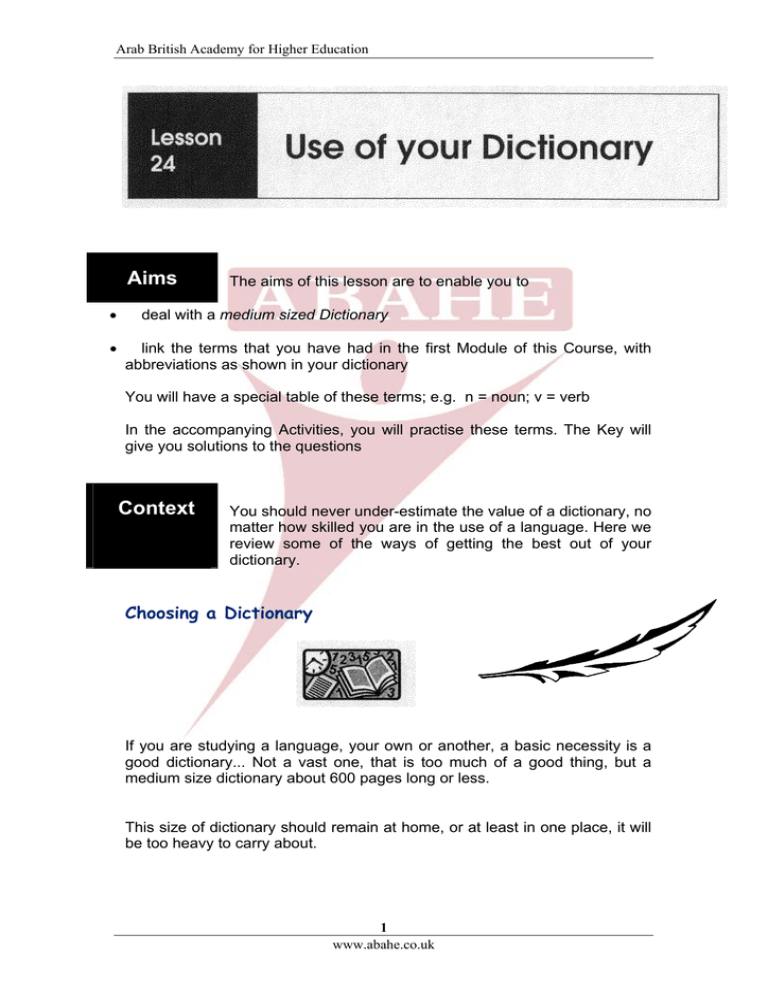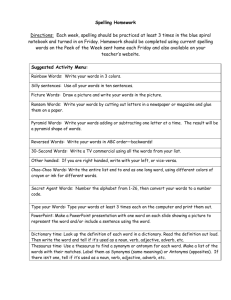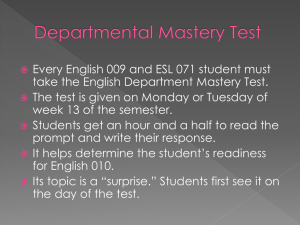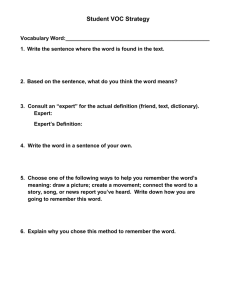
Arab British Academy for Higher Education
Aims
The aims of this lesson are to enable you to
deal with a medium sized Dictionary
link the terms that you have had in the first Module of this Course, with
abbreviations as shown in your dictionary
You will have a special table of these terms; e.g. n = noun; v = verb
In the accompanying Activities, you will practise these terms. The Key will
give you solutions to the questions
Context
You should never under-estimate the value of a dictionary, no
matter how skilled you are in the use of a language. Here we
review some of the ways of getting the best out of your
dictionary.
Choosing a Dictionary
If you are studying a language, your own or another, a basic necessity is a
good dictionary... Not a vast one, that is too much of a good thing, but a
medium size dictionary about 600 pages long or less.
This size of dictionary should remain at home, or at least in one place, it will
be too heavy to carry about.
1
www.abahe.co.uk
Arab British Academy for Higher Education
If you want a dictionary you can check through while
travelling, the Oxford Pocket Dictionary, (Hard back £9.99)
is still very useful. But there is also the Oxford Dictionary of
Current English (Paperback £3.99) which you may find even
handier...
These will have the basic words you need for everyday, and will include
spellings as well as definitions; it is the spellings of English words that are its
true nightmare.
The Thesaurus
And as well as the dictionary you can also get a thesaurus, which is a very
useful extra. It will not define or explain words but give you either equivalents
or words with opposite meanings. This type of directory can be very useful
when you are doing composition or work in a foreign language, if you are
searching for the best word to put down with a particular meaning.
The thesaurus is somewhat underrated, not being as well known or as
commonly used as the dictionary. But it can be a very handy tool for
increasing your word power, and will help you avoid boring repetitions when
you cannot think by yourself of another word with a similar meaning.
Preparation for using your Dictionary
So once you are equipped with your guide to language, how do you set
about using it? In fact, you will be quite used to it by now, having needed to
use your dictionary especially when tackling exercises in Vocabulary,
Grammar, and Passages for Comprehension...
Back to Grammar
But in order to understand fully your dictionary, you have to know something
about the grammar background of language. So if you are still a bit uncertain
of this, now is the time to go back to Module One, and have another look at
the terms presented there. What for example is: a Noun? an Intransitive
Verb? Here are some quick definitions; and I suggest if you are still
uncertain, you check back to Module One Lessons Two and Three
2
www.abahe.co.uk
Arab British Academy for Higher Education
Some Important Terms
Verb which has a Direct Object,
the Direct Receiver of the Action
Transitive Verb
e.g. In “I catch the ball”, the ball is
called the Receiver of the Action
“catch” and therefore is the Direct
Object
Intransitive Verb
This type of Verb has no Direct
Object, and so is called Intransitive
e.g. In “I went to the pictures” the
action of the verb “went” is not
passed on anywhere, and therefore
the verb is called Intransitive.
Here are some more Terms, with definitions and examples, and after that we
will show you how the Dictionary expresses these with its abbreviations
(shortened forms of words, the most difficult probably to understand...
TERM
DESCRIPTION
EXAMPLE
Noun
Name
ball
Pronoun
Replaces Noun
it, him, us
Adjective
Describes the Noun
green, big
Verb
“Doing”
word,
describing action
goes,
talks
Modifies verb
adjective
or another adverb
come here
she is very tall
he speaks too
quickly
Links nouns,
trains
Adverb
Conjunction
3
www.abahe.co.uk
has,
is,
and
Arab British Academy for Higher Education
adjectives
clauses
(groups
of
words which include a
Verb)
buses
tall and strong
they came but
did not see us.
the sun shone,
although it was
raining
Locates, or
the Noun
under the table
after the meal
Preposition
Interjection
positions
Exclamation,
usually
with an “Exclamation
mark!”
Activity 1
gosh! dash!
Now we come to Identification: here are some words with the Terms
added: you must make up sentences showing how these words are
used: there are some examples in the Key but it can only be used as a
Guide:
a) go: Verb b) before (Conjunction) c) there (Adverb)
d) in (Preposition) e) us (Pronoun
All Rights Reserved © Arab British Academy for Higher Education
4
www.abahe.co.uk








